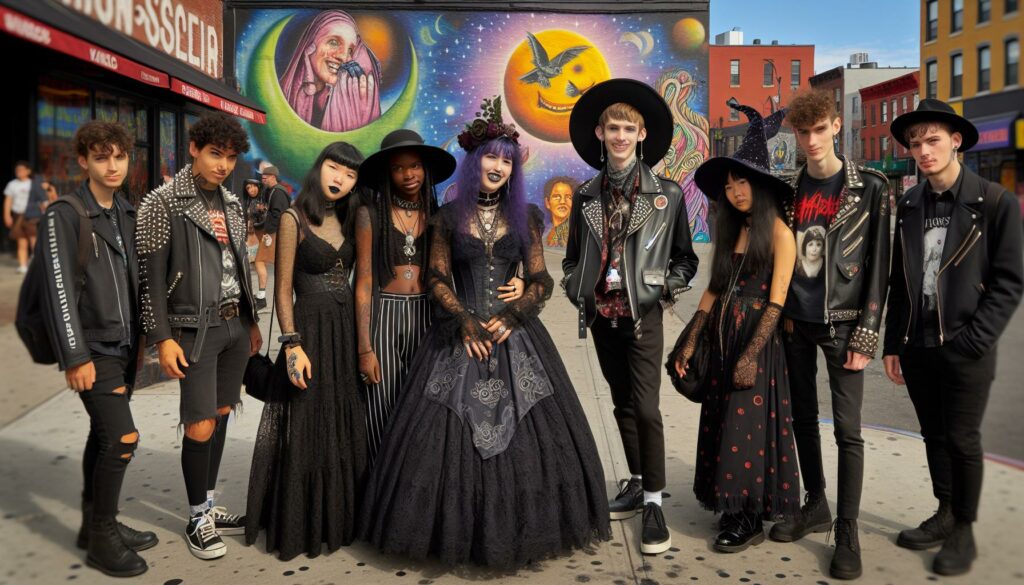As a fashion enthusiast, I find myself drawn to brands that blend unique aesthetics with ethical practices. One brand that often sparks debate is Killstar, known for its dark, alternative styles. But the question remains: is Killstar fast fashion?
Fast fashion has become a buzzword, often associated with low-quality garments and environmental concerns. In this article, I’ll dive into Killstar’s production practices, sustainability efforts, and overall impact on the fashion industry. By examining these factors, I hope to shed light on whether this brand aligns with the fast fashion model or if it’s carving out a more responsible niche. Join me as we explore the complexities behind Killstar’s identity.
- Understanding Fast Fashion: Fast fashion is characterized by low prices, high volumes, and a disposable culture, which contrasts with Killstar’s approach of promoting quality and unique designs.
- Killstar’s Business Model: The brand emphasizes ethical production practices, ethically sourced materials, and a philosophy prioritizing quality over quantity to mitigate waste.
- Sustainability Efforts: Killstar takes steps to minimize environmental impact through initiatives like recycling programs and eco-friendly packaging, setting it apart from typical fast fashion brands.
- Consumer Loyalty and Community: Strong engagement on social media fosters brand loyalty, with Killstar’s inclusive sizing and emphasis on body positivity resonating with its customer base.
- Ethical Considerations: While Killstar promotes transparency and sustainability, ongoing scrutiny from consumers regarding these claims emphasizes the need for greater accountability in the fashion industry.
is Killstar Fast Fashion
is killstar fast fashion? Killstar, founded in 2012, caters to those who embrace alternative fashion. The brand’s aesthetic draws from gothic, punk, and witch-inspired themes. Killstar offers a wide range of products, including clothing, accessories, and home decor, all designed to stand out.
Killstar emphasizes inclusivity by providing sizes that range from XS to 5XL. This commitment broadens its appeal within the alternative fashion community. The brand actively engages with its audience through social media platforms, showcasing user-generated content and cult-like brand loyalty.
In terms of production, Killstar claims to use ethically sourced materials. The brand promotes an agenda centered on quality over quantity, asserting that it avoids the pitfalls of traditional fast fashion. I find it important to analyze these claims to ascertain the actual impact on sustainability.
Killstar emphasizes its stance against discrimination and promotes body positivity, evident in its marketing campaigns. The brand’s community-focused approach fosters a sense of belonging among its customers. This factor significantly contributes to its growing popularity within the fashion industry.
Overall, Killstar positions itself as an alternative to fast fashion by prioritizing unique designs and a sense of community while claiming to be conscious of ethical concerns.
Understanding Fast Fashion
Fast fashion refers to a production model that prioritizes speed and low cost, resulting in high volumes of inexpensive clothing at the expense of quality and ethics. To assess whether Killstar fits this category, it’s essential to examine its defining characteristics and environmental implications.
Definition and Characteristics
Fast fashion brands typically share key traits, including rapid production cycles and trends that mirror high-end fashion. Features of fast fashion include:
- Low Prices: Products often come at dramatically reduced prices compared to sustainable alternatives.
- High Volume: Brands produce large quantities of clothing to meet ever-changing trends.
- Short Lifespan: Items often lack durability, leading to quick disposal and waste.
- Disposable Culture: Encourages frequent purchases, fostering a mindset of disposability.
Killstar presents a contrast to these attributes. It promotes quality, unique designs, and inclusivity. The brand emphasizes a lower turnover rate and claims to use ethically sourced materials, aiming to reduce textile waste.
Environmental Impact
Fast fashion significantly contributes to environmental degradation. Statistics indicate that the fashion industry accounts for about 10% of global carbon emissions. Key environmental impacts include:
- Water Pollution: Production processes often discharge untreated water into ecosystems, damaging habitats.
- Carbon Footprint: Transporting inexpensive garments globally adds to greenhouse gas emissions.
- Waste: Approximately 92 million tons of textile waste end up in landfills each year.
In contrast, Killstar asserts its commitment to sustainability through responsible sourcing and production practices. The brand promotes initiatives aiming to minimize environmental harm, setting it apart from traditional fast fashion models. By analyzing these factors, I aim to determine whether Killstar genuinely operates with environmental consciousness or adheres to fast fashion principles.
Analyzing Killstar’s Business Model
Killstar’s business model significantly impacts its positioning within the fashion industry. Examining the brand’s production practices and sustainability efforts reveals insights into its operations.
Production Practices
Killstar emphasizes ethical production practices, asserting that it sources materials responsibly. The brand utilizes a blend of sustainable fabrics, including organic cotton, recycled polyester, and eco-friendly materials. Killstar claims to operate with transparency, providing limited information about its manufacturing facilities to ensure compliance with ethical labor standards. Moreover, the brand maintains a lower turnover rate compared to traditional fast-fashion companies, focusing on releasing unique collections rather than constant new inventory. This approach aims to reduce waste and promote longevity in the consumer’s wardrobe.
Sustainability Efforts
Killstar proclaims its commitment to sustainability through various initiatives. The brand actively promotes a quality-over-quantity philosophy, asserting that better-made garments contribute less to the disposable fashion culture. Killstar takes steps to minimize environmental impact by using ethically sourced materials and environmentally friendly packaging. Additionally, the brand implements recycling programs and encourages customers to participate in reducing textile waste. Through these efforts, Killstar positions itself as an advocate for responsible fashion, aiming to mitigate some of the environmental issues linked to fast fashion.
Consumer Perception of Killstar
Consumer perception of Killstar shapes its market presence and brand identity. Killstar’s commitment to alternative fashion resonates with a community that values unique aesthetics and ethical considerations.
Brand Loyalty and Community
Brand loyalty among Killstar’s customers stems from its strong engagement on social media platforms. The brand encourages user-generated content, allowing consumers to showcase their styles wearing Killstar pieces. This strategy fosters a sense of belonging and reinforces community ties. With inclusive sizing and diverse product offerings, many fans express loyalty, feeling represented in a niche market often overlooked by mainstream brands. The brand’s campaigns emphasizing body positivity and anti-discrimination further deepen connections with its audience, establishing a dedicated customer base that aligns with Killstar’s values.
Ethical Considerations
Ethical considerations play a significant role in how consumers view Killstar. The brand promotes transparency in its production processes and materials, claiming an ethical sourcing agenda. Its use of sustainable fabrics, such as organic cotton and recycled polyester, appeals to eco-conscious shoppers. However, consumers scrutinize the actual implementation of these practices. While Killstar positions itself as championing responsible fashion, some critics argue that more transparency is necessary to fully assess its environmental impact. As ethical considerations remain a top priority for many consumers, ongoing evaluation of Killstar’s claims will influence its standing in the fashion industry.
Killstar’s approach to fashion presents a compelling case for those seeking alternative styles without compromising on ethics. While the brand emphasizes quality and sustainability, the ongoing conversation about fast fashion makes it essential to remain vigilant about its claims.
I appreciate the unique designs and inclusivity that Killstar offers, but I also recognize the importance of transparency in production practices. As consumers, we have the power to influence brands by demanding accountability.
Ultimately, whether Killstar fits the fast fashion mold depends on how it continues to evolve in response to environmental challenges and consumer expectations. I’ll keep an eye on their journey and encourage others to do the same.

